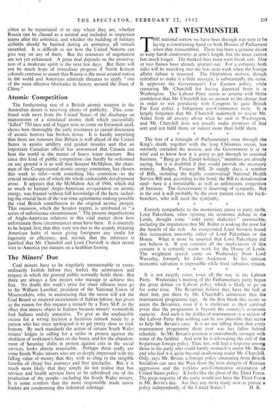Atomic Competition
The forthcoming test of a British atomic weapon in the Australian desert• is receiving plenty of publicity. This, com- bined with news from the United States of the discharge on manoeuvres of a simulated atomic shell which successfully "killed" 750 men and of bigger tests to come on Eniwetok atoll, shows how thoroughly the early resistance to casual discussion of atomic horrors has broken down. It is hardly surprising that there are rumours that Britain is well ahead of the United States in atomic artillery and guided missiles and that an important Canadian official has announced that Canada can beat the world in the matter of heavy water reactors. But since this kind of public competition can hardly be welcomed on any ground it is as well that Senator McMahon, the chair- man of the Congressional atomic energy committee, has chosen this week to refer—with something like contrition—to the crucial mistake out of which the whole undesirable development arose. It appears that the McMahon Act of 1946, which did so much to hamper Anglo-American co-operation on atomic energy, was framed without full knowledge of the facts, includ- ing the crucial facts of the war-time agreements making possible the vital British contribution to the original atomic project. This omission, which the Senator regrets, is attributed to " a series of unfortunate circumstances." The present imperfections of Anglo-American relations in this vital matter show how unfortunate. those circumstances must have been. It is sincerely to be hoped, first, that they were not due to the acutely irritating American habit of never giving foreigners any credit for ingenuity or efficiency, and, second, that the inference is justified that Mr. Churchill and Lord Cherwell in their recent visit to America put matters on a healthier footing.


































 Previous page
Previous page